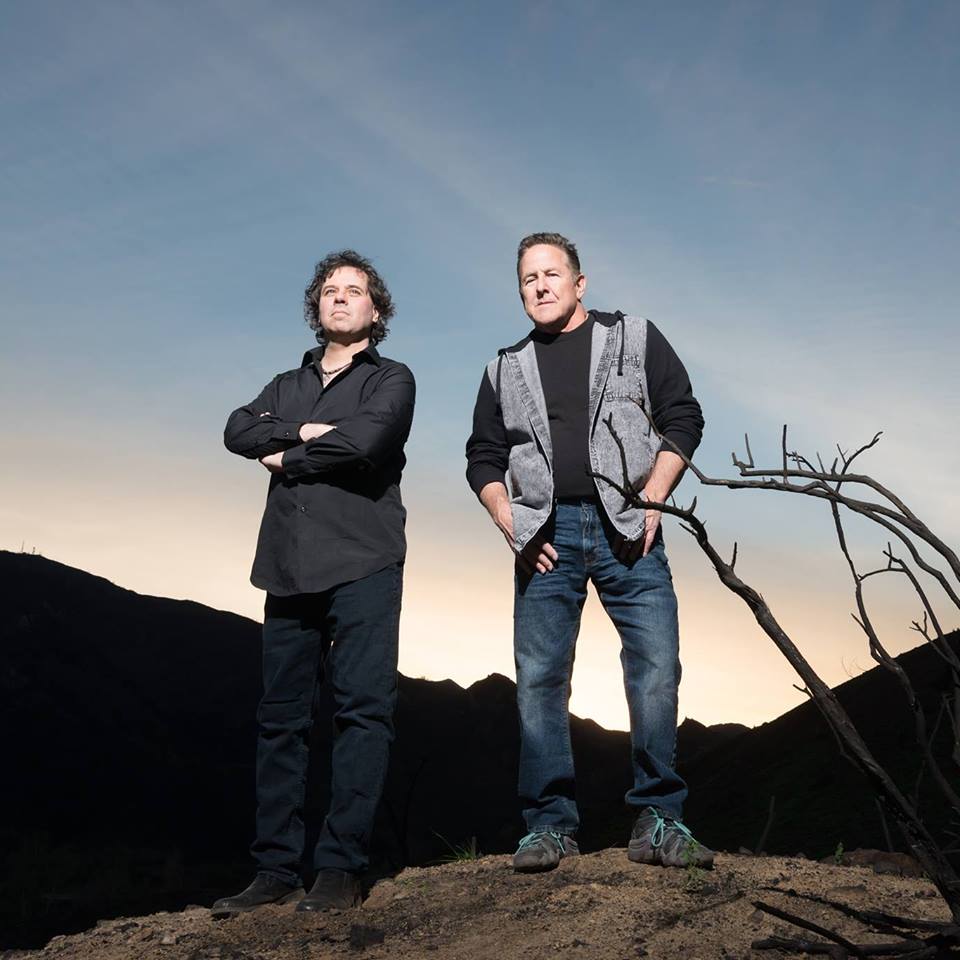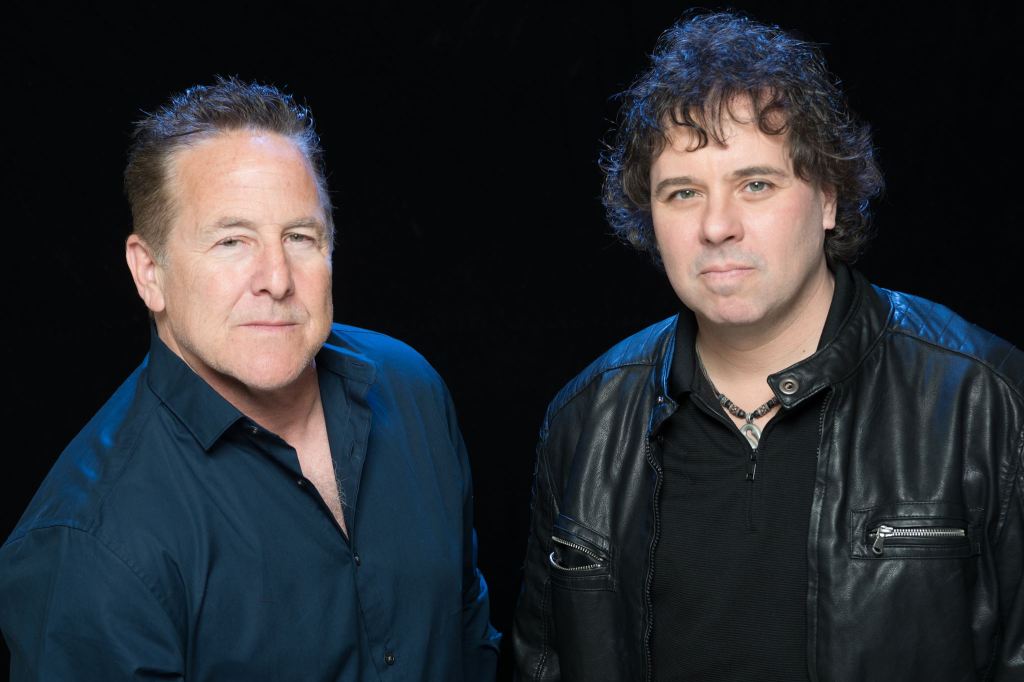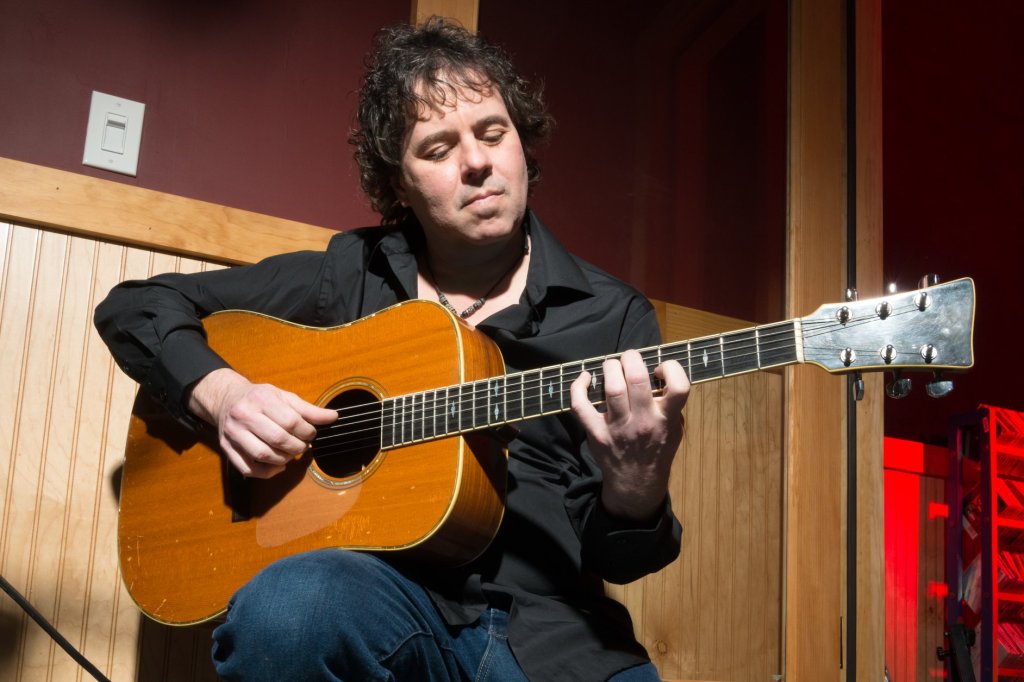
If It’s Real, the debut album from duo project Zonder/Wehrkamp was released earlier this year on May 23. This album is the result of several years worth of collaborations between drummer Mark Zonder (Fates Warning, Warlord) and multi-instrumentalist Gary Wehrkamp (Shadow Gallery, numerous collaborations). Mark is one of my all-time favorite drummers, and I’ve been a fan of Shadow Gallery for almost 20 years now, so it was a joy to interview Mark and Gary about their own personal history as collaborators, how they chose the themes for this album, and what the future holds for Zonder/Wehrkamp. Enjoy!
How did you meet initially?
MARK ZONDER: About 20 years ago I contacted Mike Varney at Shrapnel Records as I was looking for a writing partner and wanting to get something going. He referred Gary to me and I just called him and started getting things rolling.
Tell us about what drew you both together as collaborators.
MARK ZONDER: We have always worked very quickly and very much in sync. Once when Shadow Gallery was recording drums at my studio, Gary and I sat down with guitar and drums and within one hour had about 4-5 really strong ideas for songs. I believe the fact that we don’t try to change each other’s ideas is our strong point. You have two very competent musicians that feed very well off each other in a creative manner. Never a lack of ideas.
GARY WEHRKAMP: We offer each other total freedom in writing and have no end to ideas. It’s been fun putting together a variety of ideas and a seeing how we each shape the direction on our own as we go through the writing stages.
Over the years, you both have written over a hundred songs together. How did you choose which songs would end up on this album?
MARK ZONDER: These songs and this project were brought about by a label asking us to go in a darker, moodier, more atmospheric direction. Pink Floyd, Steve Wilson etc. It seemed to be the flavor of the month and the label wanted something in that style. So we did. Then later we found out that the label decided not to go in that direction, so we had no choice but to put it out ourselves. Not our first choice, but we loved the record and believe in it that we thought it would be a shame not to release to the public.
Gary Wehrkamp: We started in our natural habitat of progressive ideas and aggressive arrangements. We could have filled more than a few instrumental albums worth of the ideas we amassed. Ultimately, we switched styles a few times, and in the end headed in the direction of more sparse and emotional elements. We chose space over quantity and keyboard driven songs over an assault of metal guitar riffs.

These songs feel very personal and emotional, and address issues such as mental health and relationships. Are they based on actual experiences you’ve had, or are they more general songs about the human experience?
MARK ZONDER: That is a Gary question. I was just trying to develop emotional, feeling, airy drum patterns that would keep the songs in this style. No up-tempo double bass riffs.
GARY WEHRKAMP: Definitely both. It started out as fiction and life imitated art after a while. The lyrics were drawn from all parts of my life from distant past to recent occasions.
How were these songs recorded? Were they the product of live sessions?
MARK ZONDER: Actually, we never met face to face for these songs. I would send Gary a bunch of drum ideas and he would start writing to it. With the internet, we would send things back and forth as the songs developed. Once we had a basic idea, I would send Gary other patterns at the same tempo to help him expand on the various themes.
We both have state of the art studios, so I did the drums at my studio and sent him a stereo drum mix as I had very particular ideas of what I wanted the drums to sound like as well as all of the stereo placements and effects. He did an amazing job mixing the record. Very deep, and if you listen closely you can hear all kinds of stuff going on. I know he spent a lot of time and energy getting it just right.
Gary Wehrkamp: While Mark and I did get together quite a few years back and were able to churn out 5 or 6 song ideas in a matter of a few hours, our writing process by this point was different. Generally, one of us would start with an idea and pass it along through email. In many cases, Mark would send me a drum idea, or two, or twelve. I would import it into my studio computer and mostly write the first thing that came to my head, hoping for the best. While this method has not always worked for me in my past, there was a freedom I had knowing that the two of us were approaching this as a solo album and that we both assumed a role of total compromise.
We were so agreeable on everything that it made it easy for me to just be myself and move forward in the most natural way possible, even if I was challenging my own creative process. We would send updated recording sessions back and forth, usually twice, sometimes a few more times, and then would have the song’s arrangement. We both added layers of details and completed the songs in that way.

What gear did you use to record?
Gary Wehrkamp: My Ibanez Jem Guitar. A white Schecter Hellraiser “Diamond Series” that I bought only to shoot a video with. I fell in love with it and kept it. An old worn but loved Washburn bass I have had for decades. A variety of keyboards including my “cannot get rid of it- ENSONIQ TS-12” but mostly soft synth keyboards and loads and loads of reverbs and delays applied forward and backwards to almost everything. Neauman vocal mics. I used a great vocal mic preamp called an Aurora GTQ2 (owned by Shadow Gallery) with a distressor and I loved the sound.
I only recorded with it on some of the earlier recorded songs like, “If It’s Real,” The Next Big thing” and “Where are the Children Going?” I didn’t realize how much I loved it until I lost it in a fire. Actually, my bandmate, Carl rescued it (not during the fire but the next morning) and fixed it and kept it, but we co-own it and I had it for years prior to that.
I wrote the verses for the first song, “I Can’t Believe” after that point in time and used a different mic and preamp and it never sounded as good to me as the chorus did for that song. My recording studio location and most of the recording gear changed three times before we finished this group of songs. My perspective on life also went through some transformations and ultimate modifications during the writing and recording.
MARK ZONDER: My basic stuff. Zildjian, Drum Workshop Drums. I use Nuendo by Steinberg and a lot of Lauten Audio mics. I have my Neve, Manley, Summit Audio gear and a lot of homemade samples.
Will there be a follow up album?
MARK ZONDER: Yes, we are planning for it.
Gary Wehrkamp:Yes! I’m looking forward to see what we come up with.
For Mark: You very rarely do a simply 2-4 beat. Your rhythms on this project and on other projects are often incredibly complex and melodic. What is your process for composing drum lines for a song?
Like with the band Slavior, the song starts with my groove that I develop and work on. It would be very tough to take some of these grooves and apply it to a guitar line as it probably would not lock in. [It’s] much easier and creative for me to record ideas and then have the music put on top. Also I think it gives the other musicians a real start and jumping off point of where to go with the songs. I spend a lot of time just developing and working and recording ideas. I have hundreds.

For Mark: The emotional nature of the songs, combined with the elegance and simplicity of the compositions, reminded us a bit of one of your other musical projects (one of our favorites here at Proglodytes): Chroma Key. I wanted to know about your experience with Kevin Moore and how that came about, and how you feel about working on the Chroma Key project years later.
I thought the first 5 songs on that album with drums are fantastic and stand alone compared to anything. I thought it was a shame that the rest of the album was just a mess of sound and noise. Not big into that “experimental” stuff. I am a song guy. Did you guys ever hear a song called Chroma Key that was on the demo? That was also a song that Kevin wrote using a very cool groove that I wrote. Working with Kevin was great. I had no problem taking direction as it was his record and I was there to support and make it the best it could be. We would actually sit in a room, the two of us, with the lights out and go over songs. Very fun times.
Gary: I read that you used an unusual composition style on this record, where you followed instincts musically and were very deliberate about writing melodies. Could you explain this more in depth?
Gary Wehrkamp: I tried to do things in an unnatural way. I detuned my guitars randomly and put capos on and did large stretches with my fretting hand so I would have no idea what things would sound like. I randomly chose keyboard notes on a computer music staff and tried to not hear them in my head. I might have a keyboard patch to go along with Mark’s drum loop and then immediately add a wall of backing vocals singing “ahh” or “ooh” going, long before I wrote or sang a real word or reached for a guitar. I thought it terms of single lines on guitar and added effects rather than play typical metal rhythms in almost every case.
Sometimes, I did just pick up my guitar and strum, but used patterns I would never do like straight eighth notes nonstop throughout a song – like on the song, “I’d Do Anything.” I dislike such a lack of any variety in rhythm so I intentionally wanted to see what I could do with that. Also, my first attempt was just long held whole note chords, so I went the opposite way of my instincts. It is fun to get outside of your head and challenge yourself. Vocal melodies are endless and fun and quick. Lyrics often take me much longer. I definitely wrote songs that were different than what I normally do, and I am glad I took such procedures.

Gary: Your instrumental and vocal work on this album is really impressive! After playing a lot of the instruments and singing on this record, do you think that you will do the same on subsequent records?
Thank You! I would imagine we won’t change the current formula too much. Rather than plan it out, I have been just seeing where the moment takes me. Initially I wasn’t prepared to be the sole vocalist, but I have been coming into that role slowly for the last few decades. For better or worse, I arrived and it’s my voice as well, but I can tell you that It would not be the record it is without Mark’s creative and inventive drumming, so as long as that is part of the equation, I think we can handle it and I look forward to seeing what we can do with the next one! Thank you!
Thanks to Gary and Mark for a wonderful interview. Buy their amazing album here at their webstore, or here at CDBaby.
